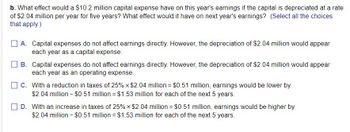a. What effect would a $9.05 million operating expense have on this year's earnings? What effect would it have on next year's earnings? (Select all the choices that apply.) A. A $9.05 million operating expense would be immediately expensed, increasing operating expenses by $9.05 million. This would lead to a reduction in taxes of 25% x $9.05 million = $2.26 million. B. A $9.05 million operating expense would be immediately expensed, increasing operating expenses by $9.05 million. This would lead to an increase in taxes of 25% x $9.05 million = $2.26 million. C. Earnings would decline by $9.05 million - $2.26 million = $6.79 million. The same effect would be seen on next year's earnings. D. Earnings would decline by $9.05 million - $2.26 million = $6.79 million. There would be no effect on next year's earnings.
a. What effect would a $9.05 million operating expense have on this year's earnings? What effect would it have on next year's earnings? (Select all the choices that apply.) A. A $9.05 million operating expense would be immediately expensed, increasing operating expenses by $9.05 million. This would lead to a reduction in taxes of 25% x $9.05 million = $2.26 million. B. A $9.05 million operating expense would be immediately expensed, increasing operating expenses by $9.05 million. This would lead to an increase in taxes of 25% x $9.05 million = $2.26 million. C. Earnings would decline by $9.05 million - $2.26 million = $6.79 million. The same effect would be seen on next year's earnings. D. Earnings would decline by $9.05 million - $2.26 million = $6.79 million. There would be no effect on next year's earnings.
Essentials Of Investments
11th Edition
ISBN:9781260013924
Author:Bodie, Zvi, Kane, Alex, MARCUS, Alan J.
Publisher:Bodie, Zvi, Kane, Alex, MARCUS, Alan J.
Chapter1: Investments: Background And Issues
Section: Chapter Questions
Problem 1PS
Related questions
Question
100%

Transcribed Image Text:**Tax Rate and Earnings Analysis**
**Scenario:** Suppose a firm’s tax rate is 25%.
**a. Operating Expense Impact**
- **Question:** What effect would a $9.05 million operating expense have on this year’s earnings? What effect would it have on next year’s earnings?
**Options:**
**A.** A $9.05 million operating expense would be immediately expensed, increasing operating expenses by $9.05 million. This would lead to a reduction in taxes of 25% × $9.05 million = $2.26 million.
**B.** A $9.05 million operating expense would be immediately expensed, increasing operating expenses by $9.05 million. This would lead to an increase in taxes of 25% × $9.05 million = $2.26 million.
**C.** Earnings would decline by $9.05 million – $2.26 million = $6.79 million. The same effect would be seen on next year’s earnings.
**D.** Earnings would decline by $9.05 million – $2.26 million = $6.79 million. There would be no effect on next year’s earnings.
**b. Capital Expenditure Impact**
- **Question:** What effect would a $10.2 million capital expense have on this year’s earnings if the capital expenditure is depreciated at a rate of $2.04 million per year for five years? What effect would it have on next year’s earnings?
**Explanation:**
- The document does not provide further details on part b. However, understanding the effect of depreciating capital expenses at a constant rate over multiple years is crucial for assessing impact on future earnings. Typically, the depreciation would spread the expense evenly across years, affecting the taxable income and earnings within each period accordingly.
Expert Solution
This question has been solved!
Explore an expertly crafted, step-by-step solution for a thorough understanding of key concepts.
Step by step
Solved in 2 steps

Follow-up Questions
Read through expert solutions to related follow-up questions below.
Follow-up Question

Transcribed Image Text:b. What effect would a $10.2 million capital expense have on this year's earnings if the capital is depreciated at a rate
of $2.04 million per year for five years? What effect would it have on next year's earnings? (Select all the choices
that apply.)
A. Capital expenses do not affect earnings directly. However, the depreciation of $2.04 million would appear
each year as a capital expense.
B. Capital expenses do not affect earnings directly. However, the depreciation of $2.04 million would appear
each year as an operating expense.
C. With a reduction in taxes of 25% × $2.04 million = $0.51 million, earnings would be lower by
$2.04 million - $0.51 million = $1.53 million for each of the next 5 years.
D. With an increase in taxes of 25% × $2.04 million = $0.51 million, earnings would be higher by
$2.04 million - $0.51 million = $1.53 million for each of the next 5 years.
Solution
Knowledge Booster
Learn more about
Need a deep-dive on the concept behind this application? Look no further. Learn more about this topic, finance and related others by exploring similar questions and additional content below.Recommended textbooks for you

Essentials Of Investments
Finance
ISBN:
9781260013924
Author:
Bodie, Zvi, Kane, Alex, MARCUS, Alan J.
Publisher:
Mcgraw-hill Education,



Essentials Of Investments
Finance
ISBN:
9781260013924
Author:
Bodie, Zvi, Kane, Alex, MARCUS, Alan J.
Publisher:
Mcgraw-hill Education,



Foundations Of Finance
Finance
ISBN:
9780134897264
Author:
KEOWN, Arthur J., Martin, John D., PETTY, J. William
Publisher:
Pearson,

Fundamentals of Financial Management (MindTap Cou…
Finance
ISBN:
9781337395250
Author:
Eugene F. Brigham, Joel F. Houston
Publisher:
Cengage Learning

Corporate Finance (The Mcgraw-hill/Irwin Series i…
Finance
ISBN:
9780077861759
Author:
Stephen A. Ross Franco Modigliani Professor of Financial Economics Professor, Randolph W Westerfield Robert R. Dockson Deans Chair in Bus. Admin., Jeffrey Jaffe, Bradford D Jordan Professor
Publisher:
McGraw-Hill Education